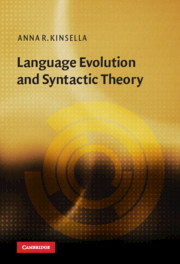Book contents
- Frontmatter
- Contents
- List of figures
- List of tables
- Preface
- List of abbreviations
- 1 Constraining our theory of language
- 2 Language as a perfect system
- 3 Language as an evolvable system
- 4 Language as a recursive system
- 5 Language as a minimal system
- 6 Towards an evolvable theory of syntax
- Bibliography
- Index
1 - Constraining our theory of language
Published online by Cambridge University Press: 30 September 2009
- Frontmatter
- Contents
- List of figures
- List of tables
- Preface
- List of abbreviations
- 1 Constraining our theory of language
- 2 Language as a perfect system
- 3 Language as an evolvable system
- 4 Language as a recursive system
- 5 Language as a minimal system
- 6 Towards an evolvable theory of syntax
- Bibliography
- Index
Summary
Language and evolution
Language is a defining characteristic of what it is to be human. One of the most fundamental questions that the field of linguistics must therefore try to answer is why language is an ability specific to our species. Attempts to provide such an answer have focused on investigating a number of peculiarities of language, best thought of as posing the following highly interconnected questions: (1) How do human children acquire language in a relatively rapid and effortless manner based on typically sparse input? (2) What are the idiosyncratic linguistic features that are found in all human languages? (3) What knowledge must the language user have? (4) How is language dealt with in the human brain?
Question (1) asks about the nature of coming to be a language user. What does the child bring to the task of acquiring his first language? Must he have prior knowledge that is specifically linguistic? Is such prior knowledge innately encoded? The second question deals with language universals. The many different languages spoken across the world all appear to conform to certain common rules or guidelines. What are these commonalities, and more importantly, why are these features, and not some others, universal? Question (3) asks about the internal state of a mature language user's mind. What does the language user have to know about both his specific language, and language generally, in order to have successful communicative interactions? The fourth question inquires into the nature of the human brain.
Information
- Type
- Chapter
- Information
- Language Evolution and Syntactic Theory , pp. 1 - 38Publisher: Cambridge University PressPrint publication year: 2009
